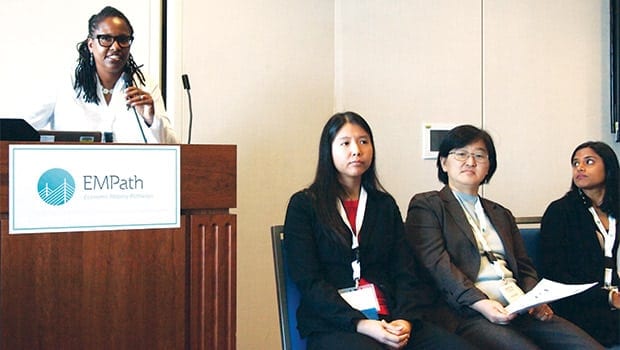
Researchers at a poverty conference last week sought to dispel the narrative that hard work, careful economic decisions and formal higher educational attainment are enough to close the wealth gap between blacks and whites. Far more significant in determining children’s future wealth is their parents’ ability to give them financial assistance, speakers said, adding that continued emphasis on pulling oneself up by one’s bootstraps gets in the way of creating a more accurate picture of the situation and actions needed.
“One of our deepest held American narratives is that success comes from grit and gumption and working hard,” said Anne Price, president of the Insight Center for Community Economic Development, during a panel on closing racial wealth gaps. “[But] for black families, studying and working hard doesn’t necessarily mean that they’ll amass the same amount of wealth as white families. Family resources really matter in the ability to actually accumulate wealth — what families are able to pass down from generation to generation plays a big role in where you end up.”
The panel came as part of a two-day Disrupting the Poverty Cycle conference, hosted at UMass-Boston. The event was organized by Economic Mobility Pathways, a Massachusetts-based group that seeks to bring economic advancement to low-income individuals through programs, research and advocacy.
The data
Panelists focused their attention on wealth, defined as the value of what someone owns — such as a house, business, car and retirement savings — minus what the person owes.
The researchers analyzed data from a University of Michigan study that has followed a set of U.S. households from 1968 on, with the latest available data reflecting 2013, as well as data from another study that asked the same question but focused in more detail on select cities, including Boston.
Individuals were asked to self-identify their “main” race. In cases where the person was black-white biracial, they were identified as black. According to Khaing Zaw, statistical research associate at Duke University, the wealth of such biracial individuals more closely matched that of blacks than whites.
Narratives and parental aid
A 2014 Pew Research survey found that nearly 60 percent of Americans believed life success is determined by factors within individuals’ control. Often, the prevalent narrative is that people need to simply work hard and plan strategically, such as by deciding to save for college, researchers said.
But data contradicts this thinking. Attaining bachelor’s degrees does not close the gap between blacks and whites: Researchers in the national UMichigan study found that black couples with bachelor’s degrees had a net worth of $38,000 compared to white couples with $329,000. One reason, researchers said, that pursuit of higher education may force those with much less wealth available for tuition to acquire significant student debt.
The grit-and-formal-education narrative inhibits a more accurate view of drivers of wealth disparities — such as less inherited wealth that can be put toward college — and prevents public policy from targeting the true causes, researchers said.
Due to longstanding racial inequities, white families tend to have more wealth accrued than black families, and so have greater financial resources they can leverage to assist their children in making downpayments on houses, attending college with minimal or no loans and making other investments that in turn, help them accrue more wealth, presenters said. In many cases, it takes money to make money: Liquid assets are needed to start a business and acquire a house.
Adding to the advantage: those who have more wealth also may have social connections and familiarity navigating financial systems that further help their children.
“Blacks kids are receiving less help from parents simply because parents have fewer resources,” said Yunju Nam, researcher from the State University of New York at Buffalo.
Nam said that the national data found 33 percent of whites received parental assistance in funding their education, compared to 14 percent of blacks, and 13 percent of whites received parental help buying a home, versus 2 percent of blacks.
Next steps
The research underscores the need for policy reform to improve funding of public schools and provide cheaper, if not free, access to college, Nam said. Among the ways to do this: tuition aid based on need, not merit; government-provided matching college savings accounts for children;and reform of student loans, she said.
“It was better in the past to borrow some money and go to college,” Nam said. “But now? Savings interest is less than 1 percent, but students pay sometimes 8 percent on loans. So how much money your father or mother has has a big impact on your education.”
Government also can focus on assisting minority groups in acquiring homes and enforcing more strongly anti-discrimination policies in housing and mortgage markets, she said.
Community organizations could assist as well by helping students who are low-income and of color navigate scholarship applications, Nam suggested. She added that if need-based financial aid can be secured, in some cases elite colleges may be the more affordable options.






